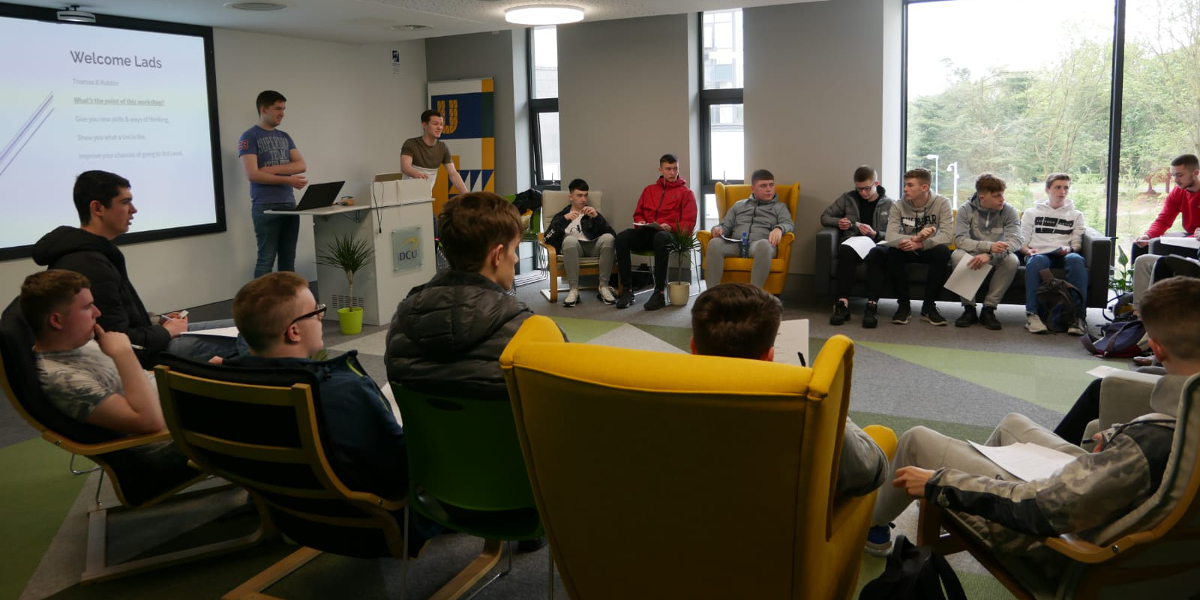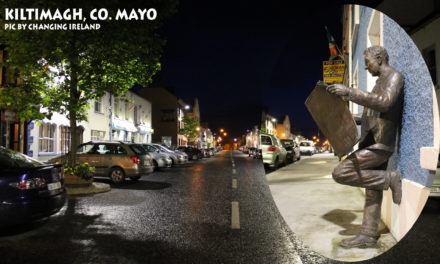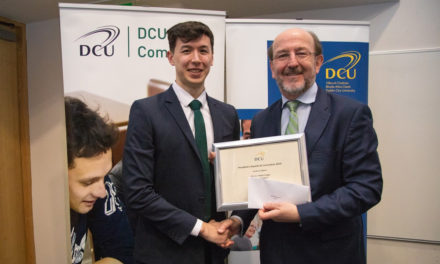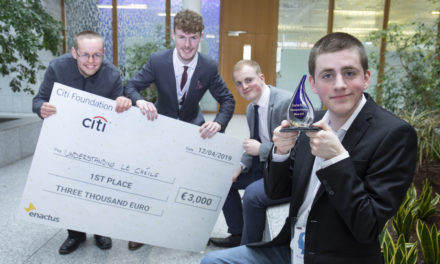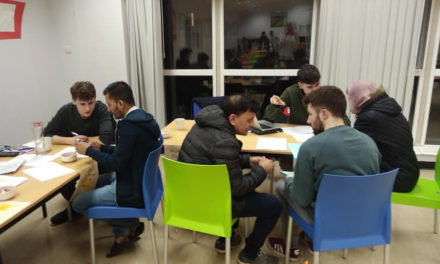Not everyone is fortunate enough to get the same opportunities and support in life. When it comes to third-level education, YouthOpia hopes to help close the gap.
Depending on where you grew up and where you went to school, following the set path of ‘primary school, secondary school, third-level institution, work’ is often presented as a foregone conclusion. However, for some people – particularly those from disadvantaged areas – that path becomes a lot more complex, or abruptly ends entirely.
The negative perception that many outsiders have of disadvantaged areas can frequently be perpetuated within those communities themselves, with students, parents and even teachers taking the view that pursuing education beyond the Leaving Certificate is unnecessary or, worse, unattainable.
YouthOpia founder Robert Kelly and co-founder Thomas Bird share that background. Having witnessed first-hand the attitude that pervades DEIS schools and the communities around them, Robert realised he wanted to make a difference. When he joined Enactus DCU (Dublin City University), he – and co-founders Thomas, Vivien Kajli and Kathi Nie – found a way.
Here, Robert, Thomas and Vivien speak to Kirsty Tobin – in an interview conducted in collaboration with Enactus – about YouthOpia and what they hope it will achieve.
Can you tell us about YouthOpia?
Thomas Bird: YouthOpia is a student-run social enterprise founded within the Enactus Ireland programme. Our mission is to help students from disadvantaged backgrounds reach third-level education by providing them with workshops that address underlying non-academic factors that contribute to their academic success.
The YouthOpia team set out to create a curriculum that would encourage students in a fun and practical way so that the skills they learn from our workshops will follow them throughout their academic life.
Robert Kelly: From our extensive research into barriers to progression, we found many emerging trends, mostly non-academic. Issues such as low self esteem, poor self image, a lack of self belief and a negative culture in the classroom were alarmingly common among students in DEIS schools.
Thomas Bird: From these trends we created four modules that would help address these persistent problems: Vision, Plan of Action, Mindset and Resilience.
The goal of these modules is to enable these students to reach their full academic potential.
What social need does your project address?
Thomas Bird: It addresses a pattern that has developed among DEIS schools in Ireland. There is an attitude in these schools – among students, teachers and families – that financial circumstances and the family’s academic background affect the ambitions and the potential of a student. Usually, this means third-level education seems out of reach and impossible.
By helping the students believe in themselves and their ambitions, we are indirectly impacting the families and teachers. There are so many routes into third level and further education, and YouthOpia gives everyone the skills to explore them.
Robert Kelly: We all know why students don’t progress onto third-level education. The answer? Points awarded from the Leaving Certificate. I like to think of it this way: points are the disease, but what are the symptoms?
When I look back on my own life I realise now that I suffered with a lot of the same issues students face today. However, I was one of the lucky ones. I had an amazing mother who helped instil an unshakeable belief in myself. I had an intervening force in my life that put me on track.
Not everybody is that lucky. Not every student has a loving home or supportive network. All the grinds in the world won’t help if you think you’re unworthy and stupid. Without an intervening force, students are left to sit with their demons.
My vision for YouthOpia is that we will be that intervening force for all DEIS students across the island for years to come.
‘There is no point in having an answer without a question.’
– Thomas Bird
What first stirred your interest in this area?
Robert Kelly: Growing up and attending a DEIS school, I saw a lack of progression to third-level education first-hand. I was immersed in a culture of not believing in oneself and therefore not trying. Without some baking powder, a muffin mix won’t rise when baked. I want YouthOpia to be the baking powder for students in DEIS schools. I feel this project can help them rise to their highest potential.
Thomas Bird: I wanted to get involved because, coming from a DEIS School myself, I was aware of the issue as I had experienced it first-hand. I felt I could relate directly to the students and give my personal perspective to the project, as I know how they feel struggling to believe in themselves and their ability. I feel YouthOpia has the ability to hugely impact students in DEIS schools.
Vivien Kajli: I’ve always been interested in teaching people, and YouthOpia gives me the experience to do so through developing the curriculum and the workshops. Also, I feel that this project gives the opportunity to help young people change their perspective of their future. When I heard about the concept of YouthOpia, I knew I wanted to get involved due to the empowerment it provides to the students.
What prompted you or inspired you to get involved with Enactus?
Robert Kelly: I was interested in Enactus because I have a keen interest in entrepreneurship and service. Enactus allows me to combine the two in a valuable way. This allows me to grow as a professional and help others.
Thomas Bird: I came to college wanting to get involved in societies to look for a new passion or interest. I heard about Enactus through the Business School at DCU and it had me hooked from the word go. I was really excited about getting involved in the projects and the committee. After a few initial meetings, I became heavily interested in all things Enactus and have been involved ever since.
Vivien Kajli: I didn’t know about Enactus until I came to college, attended the start-up meeting and read up about what Enactus has to offer me. The concept of helping people out while building on my entrepreneurial skills, and networking as well as meeting lifetime friends, was very appealing to me.
What have you learned about social enterprise and community-focused entrepreneurship since starting this project?
Thomas Bird: Before Enactus, I think it’s fair to say that we were all pretty clueless about the world of social entrepreneurship. Enactus has opened our eyes to the ongoing work hundreds of social enterprises do every day, tackling social issues both in Ireland and across the world.
YouthOpia taught us that there are so many social issues hidden in our community, and that social businesses give the opportunity to resolve these issues and create a large impact.
YouthOpia showed us that to get a solid foundation for any project, a thorough needs assessment needs to be carried out to identify the issue at hand and ways of solving it. There is no point in having an answer without a question.
Why do you think social enterprise matters?
Thomas Bird: As clichéd as it sounds, it puts people before profit, tackling everyday issues in a sustainable and scalable way. I feel that without social enterprise a lot of social problems – such as dyslexia and the issues facing DEIS schools – would get overlooked and not recognised in society.
Vivien Kajli: It helps the community and tackles sometimes invisible social issues, which also helps raise awareness. There is so much creativity evident in social enterprises, from the name of the project to the plan of action. You get to create and work on something you’re passionate about. We need more social enterprises in the world.
Do you think you’ll work to develop social enterprises after graduation, or even continue to grow your Enactus project?
Robert Kelly: There is so much scope for scale with YouthOpia. We’ve built such as solid foundation thanks to our amazing team and now all we have to do is begin rolling it out across the island of Ireland. I know YouthOpia will be a big part of my life for many years to come and I’m very excited to see what we make of it.
Thomas Bird: Enactus has given us skills and inspired us to continue to tackle social issues and make an impact on people’s lives, whether that is through social enterprise or another medium.
We on the founding team would love to see YouthOpia continue to grow and become its own sustainable social entity that can employ people and make a difference in communities. It is a future ambition of the team to be able to work full-time on YouthOpia after graduation, as we believe it has the ability to go from an Enactus project to a full-time social business.
Vivien Kajli: I’d love to continue working on YouthOpia! It became such an important part of my life in the past year that I can’t imagine not working on it.
What advice would you give to students considering developing an Enactus project in the future?
Robert Kelly: Do it for the right reasons. Identify a problem in a community and find a solution. Keep it simple. Keep it effective. Never forget that there are people relying on you. Realise that we are all here to serve others.
Thomas Bird: A slow start is a good start. As we mentioned above, a thorough needs assessment is essential to provide a sustainable solution. This can be a long and vigorous process, but is beneficial in the long run. It is important to pay attention to detail during the desk and field research period to truly understand the mission of the project and the end goal.
I feel that planning is essential for a successful project, as it highlights the work that needs to be completed and sets goals across a timeline. Even if the plan has hiccups and curves, it is there as a guide and can be changed. To create a successful plan, it has to be mutually agreed on by all team members, with roles established from the outset.
And, finally, enjoy the ride! Setting up your project may seem hard at times, but when you look back you’ll see it was all worth it. Remember to build relationships with people you meet, cherish the impact you have made and look back on all the memories and achievements you have compiled.

